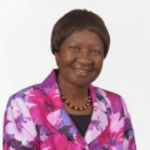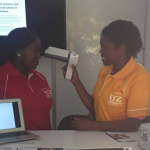
INASP partners reflect on 25 years of achievements
Throughout the past 25 years, INASP has been proud of the partnerships which have been helping us to support both institutions and individuals to produce, share and use research and knowledge which can transform lives. This blog post, part of a series celebrating INASP’s 25th anniversary, looks at what some of INASP’s partners and associates feel collaboration with INASP has achieved.
The last 25 years have seen INASP develop strong, horizonal partnerships that champion local expertise and strive towards developing sustainable local change:
Dr Haseeb Md. Irfanullah, who is a member of the editorial board of Bangladesh Journal of Plant Taxonomy, which is on the Bangladesh Journals Online (BanglaJOL) platform, explains:
“I have been involved with INASP for the last 10 years, particularly in developing capacity in research communications and editorship. During this time, INASP’s approach has changed. At the beginning, INASP used to send their own experts from the UK to facilitate trainings on how to use and manage its online platform BanglaJOL for editors and scientists in Bangladesh. Since 2011 INASP has started offering grants to engage local experts and enthusiasts, like me, to improve the research communications ecosystem of Bangladesh through local trainings. Last year, I experienced a milestone support from INASP. It supported Bangladesh to develop a longer-term plan – a Roadmap – to gradually improve journal publishing complying international standards.”
Over the course of the INASP-led VakaYiko project in evidence-informed policy making (EIPM), which ran from 2013 to 2017, INASP built up several strong partnerships. One of these was with the Latin American think.net Politics & Ideas, which was a recipient of a VakaYiko grant and is now a key partner in new work based on the jointly developed Context Matters framework. Vanesa Weyrauch and Leandro Echt commented:
“During our time working with INASP we have been impressed with INASP’s openness and genuine horizonal and collaborative work with partners worldwide. INASP constantly seeks to expand its network and build fruitful partnerships in new regions such as Latin America, where it partnered with us to expand the scope of their work to support Latin American policymakers. INASP’s innovative spirit enables it to embark on new initiatives and test new approaches that other international development players take more time to embrace, for example committing to working with public agencies as key partners in promoting better use of available knowledge. Besides keeping a high qualified team along the years, INASP counts on a warm and human staff, with a distinctive collaborative and learning spirit.”
One of INASP’s longest-standing areas of work is in improving the availability and access to research publications. . Several partners highlighted the importance of this work along withd INASP’s more recent focus on supporting Southern library consortia to strengthen national mechanisms to secure and manage research resources. As Librarian and long-time INASP Associate Helena Asamoah-Hassan told us last year,
“INASP has ensured resources get into researchers’ hands by making sure developing countries have access to highly discounted prices of e-resources. INASP has also ensured that librarians, researchers, IT personal are well skilled to enable them to have access and use electronic resources effectively.”
 Another INASP Associate, Jacinta Were, agreed about the importance of consortia supporting each other in e-resource provision:
Another INASP Associate, Jacinta Were, agreed about the importance of consortia supporting each other in e-resource provision:
“I have worked with INASP for the last 15 years and one of the things that we’ve been doing over these years is to encourage countries to come up with a library consortium so that they, for sustainability, can support each other.”
Dr Joel Sam, Director of the Council for Scientific and Industrial Research, Institute for Scientific and Technological Information (CSIR-INSTI) and Chair of the Consortium of Academic and Research Libraries in Ghana, pointed to how INASP’s long-term approach to partnership has enabled his institution to build on the improved access to research:
“INASP has helped us realise the need for us as a university from a developing country to engage more with publishers…I believe that if we work together we will be able to get up-to-date information that we require. INASP have been very supportive in terms of helping us get electronic resources as well as training.
“Currently, we are working with INASP on AuthorAID – trying to embed scientific writing into our research organizations as well as proposal writing. These are particularly important as research scientists are being asked to write more papers for promotion and to generate more funds.”
Other partners also point to the work of the AuthorAID project in capacity development of both individual researchers and their institutions, a view reflected in the findings of the recent AuthorAID impact study.
AuthorAID Associate Alejandra Arreola is Administrator of the AuthorAID/Latindex Spanish Online Course:
“In the last few years, I have seen AuthorAID move from face-to-face training into online training, which has allowed INASP to reach a wider audience outside their partner countries. Also, in the last couple of years, more voices have been added to the AuthorAID blog, providing diverse and enriching experiences and tips to all our readers.”
Amila Tennakoon of Sri Lanka’s National Science Foundation, which runs the Sri Lanka Journals Online platform (SLJOL), noted the support of our funders to the work of bringing Southern research to a global audience.
“With the support of the SRKS programme managed by INASP and funded by DFID and Sida my institution, National Science Foundation had been enabled to facilitate an amazing unique platform, SLJOL, for online publishing of Sri Lankan peer-reviewed journals. This platform can be considered as a gifted channel to Sri Lankan scientists since it provides worldwide visibility to their research output.”
We would like to say a very big, “thank you!”, to everyone who took the time to share their view on what collaboration with our team has achieved. In our mission to place research and knowledge at the heart of development, we strive to achieve long term, sustainable impact. We approach this through capacity development based on an understanding of what works in local contexts and developing partnerships built on an inclusive, participatory approach. Stay tuned for our next anniversary blog to see where some of our close partners feel INASP should focus future efforts.



 Previous Post
Previous Post Next Post
Next Post



Great work that INASP is doing. Thru my training on Research writing in 2014, I was able to network in my areas of interest and registered with ResearchGate for visibility. I even learnt to blog and got a grant to train on writing skills which did not happen since I could not access matching funds within the short notice. Will try next time.